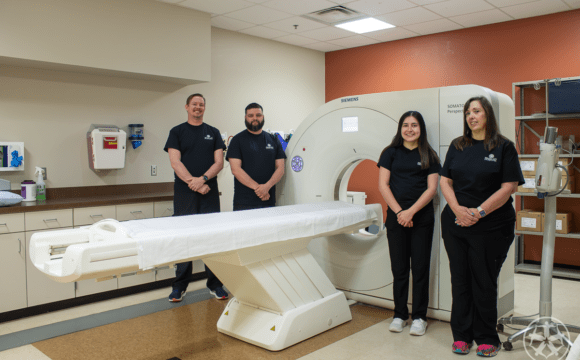Medical CT Scans
Experience the pinnacle of medical imaging excellence at Medical Arts Hospital. Our advanced CT scan services, specializing in medical CT scans, deliver unparalleled precision and detailed imagery for diagnosing a range of health conditions. Backed by state-of-the-art technology and a team of seasoned professionals, we guarantee accurate and efficient results that empower patients with the knowledge needed for effective treatment. Discover our comprehensive CT scan services today and witness our unwavering commitment to your health and well-being.
What Can I Expect During the Medical CT Scan?
The scanner is essentially a large circular machine with a table extending from the opening in the center. A highly trained CT technologist will assist you in getting situated and comfortable on the table, explain the procedure, and answer questions you may have. The CT scan technologist will monitor the exam from the adjacent control room, and you will be able to communicate with them using a two-way intercom.
You may be given an intravenous injection to increase the contrast between different tissues. This is accomplished via a small catheter inserted into a vein. The catheter is removed immediately after the exam is complete.
As the exam begins, the table will gently slide into the scanner’s opening. Throughout the exam, you may hear the scanner rotating and feel the table move slightly to allow the scanner to capture the appropriate images. The technologist may ask you to hold your breath at certain points during examinations of the chest, abdomen, and pelvis. This helps minimize any blurring of images caused by breathing or other motion.
Will I Be Exposed to Radiation?
While computed tomography is considered a safe examination, you will be exposed to a low dose of radiation. The CT equipment also has dose-limiting features to help reduce the amount of radiation received during the test. The diagnostic benefit of a CT scan greatly outweighs the risk of radiation.
How Long Will the Medical CT Scan Take?
When it comes to your health, we understand that time is of the essence. At Medical Arts Hospital, we strive to provide efficient and streamlined medical CT scans, ensuring you receive the care you need without unnecessary delays. The duration of a CT exam can vary depending on how many images are to be generated; an exam generally takes 30-45 minutes, although a very detailed study may take longer.
How Do I Prepare for the Exam?
In some cases, you will be asked to ingest a liquid that will enhance the images captured by the CT scanner. Should your exam require special preparations, your physician will provide you with additional information. In order to obtain the highest quality images, you will be asked to remove any items that could obstruct the scan, such as jewelry. Some scans will require you to change into a hospital gown.
How Will I Know the Results?
Following your exam, a radiologist specializing in CT will analyze and interpret the images from your exam and prepare a full report. This report will be sent directly to your physician, who will share the results with you. To request a copy of the report, you may contact your physician’s office, or Medical Arts Hospital’s Medical Records Department at 806-872-2183.
How Do I Schedule an Appointment?
When your physician orders a CT for you, the physician’s office will either contact the scheduling center or have you make the arrangements. If your physician asks you to make the arrangements, please contact us at (806) 872-2183. Please have your order available when you call, as we will need to know the type of CT and the diagnosis your physician has indicated for the procedure.
What Do I Need to Bring With Me on the Day of the Exam?
Preparing for your medical CT scan at Medical Arts Hospital is simple. To ensure a smooth process, please remember to bring the following items with you on the day of your appointment:
- Physician’s Order: Please bring the order that your physician provided you for the CT scan, only if it has been provided to you. This order contains important details about the specific scan you require, enabling our team to tailor the procedure to your unique needs.
- Personal Identification: Bring a valid form of personal identification, such as a driver’s license or passport. This is necessary for verification purposes and to ensure accurate patient identification throughout your visit.
- Insurance or Medicare Information: If applicable, bring any relevant insurance or Medicare information. Our dedicated staff will assist you in processing your claims and ensuring a seamless billing experience.
By having these essential items ready, you can expedite the check-in process and focus on your well-being. Rest assured that our compassionate team is here to guide you every step of the way, ensuring your comfort and providing the highest quality medical care.
At Medical Arts Hospital, we are dedicated to providing exceptional medical cat scans that offer unparalleled diagnostic accuracy. Trust our advanced CT scan services to deliver precise results, guiding your path toward optimal health and wellness. Contact us today and experience the expertise and care that sets us apart.


